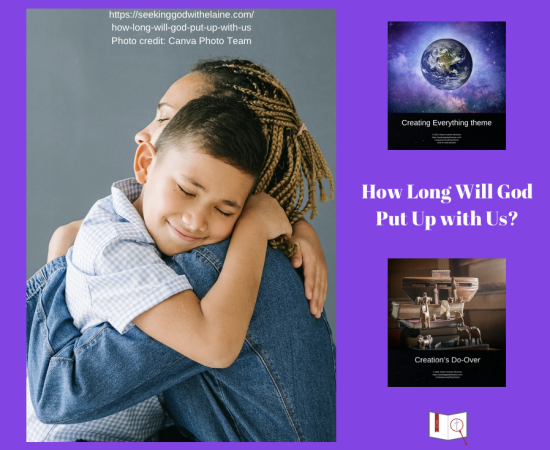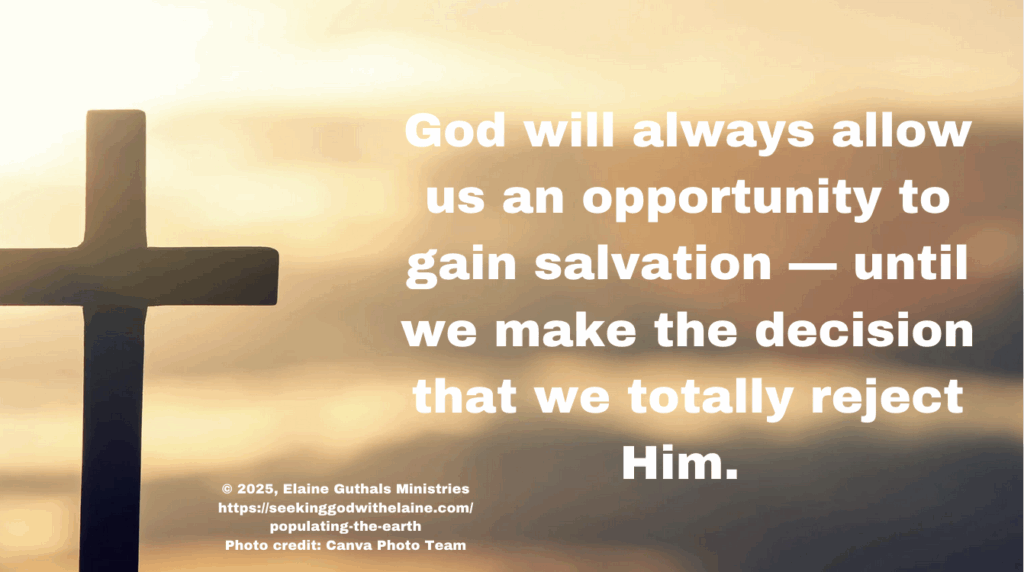God had commanded that humans should multiply and fill the earth. This devotional reading looks at how that went even more astray.
Nuggets
- The earth was filled with those who walked with God and those who didn’t.
- God’s spirit strives within us.

How did the people get from living and walking with God to mass wickedness? Let’s start looking into that.
Let's Put It into Context
To read devotions in the Creating Everything theme, click the button below.
Devotions in the Creation’s Do-Over series
Go Forth and Multiply
“Then the people began to multiply on the earth, and daughters were born to them. The sons of God saw the beautiful women and took any they wanted as their wives. Then the Lord said, ‘My Spirit will not put up with humans for such a long time, for they are only mortal flesh. In the future, their normal lifespan will be no more than 120 years.’ In those days, and for some time after, giant Nephilites lived on the earth, for whenever the sons of God had intercourse with women, they gave birth to children who became the heroes and famous warriors of ancient times” (Gen. 6: 1-4 NLT)
The earth was filled with those who walked with God and those who didn’t.
We’ve talked about how Cain and Seth both did their part in multiplying on the earth. While only one son is mentioned by name in both lines, I am sure that both had other sons and daughters — even though that is only documented in Seth’s line.
In fact, we know that is true because of verse 2 — which we also have already talked about. We wondered whose daughter Mrs. Cain was.
We also talked about who the sons of God and who the daughters of men are — their children being the Nephilim. The Anakim (descendants of Anak) were also the descendants of the Nephilim. So the way I see it, the Nephilim is like their race (mixed race giants) with the Anakim being a specific branch of the family tree.
Geikie had another take. He thought it was intermarriage between those practicing idolatry and the chosen people. In other words, those of the line of Seth/sons of God (Godview) marrying those of the line of Cain/daughters of men (worldview).
Resource
The difference lies in the moral character. No, not being a good person but walking with God as someone made in His image. We have Enoch’s walk with God and Jesus’ life in which to model our lives.
Not Put Up with Humans
“Then the Lord said, ‘My Spirit will not put up with humans for such a long time, for they are only mortal flesh. In the future, their normal lifespan will be no more than 120 years’” (Gen. 6: 3 NLT)
God’s spirit strives within us.
God gave humankind the breath of life, creating a dual existence. “Then the LORD God formed the man from the dust of the ground. He breathed the breath of life into the man’s nostrils, and the man became a living person” (Gen. 2: 7 NLT).
God created a lifeless body and animated it by breathing the spirit of life in us.

I don’t see this as the Holy Spirit. It can’t be because the Holy Spirit because, in the Old Testament, the Holy Spirit was on but not in people.
Only at Pentecost did the Holy Spirit enter us. “On the day of Pentecost all the believers were meeting together in one place. Suddenly, there was a sound from heaven like the roaring of a mighty windstorm, and it filled the house where they were sitting. Then, what looked like flames or tongues of fire appeared and settled on each of them. And everyone present was filled with the Holy Spirit and began speaking in other languages, as the Holy Spirit gave them this ability” (Ac. 2: 1-4 NLT).
God putting up with us is an interesting translation. The Orthodox Jewish Bible translated it as striving. In other words, God wasn’t going to continue to fight us.
It looks like God has done what He said.
When we talk about the days of Noah, we see that as the lawlessness of the land. Instead, it was also God pulling His hand away.
Think about it.
- “When the Son of Man returns, it will be like it was in Noah’s day” (Mt. 24: 37 NLT).
- “So he went and preached to the spirits in prison — those who disobeyed God long ago when God waited patiently while Noah was building his boat. Only eight people were saved from drowning in that terrible flood” (I Pet. 3: 19-20 NLT).
When we think about the days of Noah, we like to think about God waiting patiently around a hundred years to get the ark built. But prior to that, God had been pulling back His hand.
As we look back in our history, don’t we see God pulling back His hand? Don’t worldview people argue there is no God because He isn’t slapping them down?
Finney told us what it looks like when God is striving in us.
- We recognize unrest in our souls.
- We know we have sinned.
- We feel guilt for our sins.
- We seek God only through salvation through Jesus.
Resource
What I disagreed with Finney was when he said God’s withdrawal would be individually, not from humankind as a whole. Wrong. We see that He has gradually been withdrawing from humankind.
Isn’t that so sad? We will ignore sin, therefore ignore the guilt and unrest within us. We will refuse Jesus.
Can we spell Day of the Lord?
- “But when the Son of Man comes in his glory, and all the angels with him, then he will sit upon his glorious throne. All the nations will be gathered in his presence, and he will separate the people as a shepherd separates the sheep from the goats. He will place the sheep at his right hand and the goats at his left” (Mt. 25: 31-33 NLT).
- “And anyone whose name was not found recorded in the Book of Life was thrown into the lake of fire” (Rev. 20: 15 NLT).
- “Not everyone who calls out to me, ‘Lord! Lord!’ will enter the Kingdom of Heaven. Only those who actually do the will of my Father in heaven will enter. On judgment day many will say to me, ‘Lord! Lord! We prophesied in your name and cast out demons in your name and performed many miracles in your name.’ But I will reply, ‘I never knew you. Get away from me, you who break God’s laws” (Mt. 7: 21-23 NLT).
But let’s say it is individual. Genesis 6: 3 speaks to whether God will always extend salvation to us, or whether there is a time when He will stop offering salvation.
There seems to be conflicting verses about this. Some say God will never leave us. Others say we have a time limit to seek Him.
- “It is the Lord who goes before you. He will be with you; he will not leave you or forsake you. Do not fear or be dismayed” (Deut. 31: 8 ESV).
- “Keep your life free from love of money, and be content with what you have, for he has said, ‘I will never leave you nor forsake you’” (Heb. 13: 5 ESV).
- “Be strong and courageous. Do not fear or be in dread of them, for it is the Lord your God who goes with you. He will not leave you or forsake you” (Deut. 31: 6 ESV).
- “No man shall be able to stand before you all the days of your life. Just as I was with Moses, so I will be with you. I will not leave you or forsake you” (Josh. 1: 5 ESV).
- “Fear not, for I am with you; be not dismayed, for I am your God; I will strengthen you, I will help you, I will uphold you with my righteous right hand” (Isa. 41: 10 ESV).
- “Have I not commanded you? Be strong and courageous. Do not be frightened, and do not be dismayed, for the Lord your God is with you wherever you go” (Josh. 1: 9 ESV).
- “Keep your life free from love of money, and be content with what you have, for he has said, ‘I will never leave you nor forsake you.’ So we can confidently say, ‘The Lord is my helper; I will not fear; what can man do to me?’” (Heb. 13: 5-6 ESV).
- “Behold, I am with you and will keep you wherever you go, and will bring you back to this land. For I will not leave you until I have done what I have promised you” (Gen. 28: 15 ESV).
- “Seek the LORD while you can find him. Call on him now while he is near” (Isa. 55: 6 NLT).
- “Therefore, let all the godly pray to you while there is still time, that they may not drown in the floodwaters of judgment” (Ps. 32: 6 NLT).
- “But as he came closer to Jerusalem and saw the city ahead, he began to weep. ‘How I wish today that you of all people would understand the way to peace. But now it is too late, and peace is hidden from your eyes’” (Lk. 19: 41-42 NLT).
I think we do have a time limit to gain salvation. It is different for each individual, and it is one we set for ourselves.
God will always allow us an opportunity to gain salvation — until we make the decision that we totally reject Him. Once we make our final decision, He is gone to those who reject Him or will never leave those who obey.

There are two choices — obey God or obey Satan. The decision — as always — is up to us.
An example of this is Esau. Ditto for King Saul.
- “Make sure that no one is immoral or godless like Esau, who traded his birthright as the firstborn son for a single meal. You know that afterward, when he wanted his father’s blessing, he was rejected. It was too late for repentance, even though he begged with bitter tears” (Heb. 12: 16-17 NLT).
- “Rebellion is as sinful as witchcraft, and stubbornness as bad as worshiping idols. So because you have rejected the command of the Lord, he has rejected you as king.
Fenner saw that at God changing His mind. No, it isn’t His choice — it is ours.
Resource
God’s choice is He wants everyone saved. “This (living peaceful and quiet lives marked by godliness and dignity) is good and pleases God our Savior, who wants everyone to be saved and to understand the truth” (I Tim. 2: 3-4 NLT).
But God is not going to force us to obey Him. It is our choice — called free will.
What does God not offering salvation look like? Seiss helped us with that. He wrote, “There may be a loss of the external means and opportunities of salvation, or such a separation from them, as for ever to prevent our reaching it.”
Resource
It isn’t just someone coming to witness. It is the loss of the Holy Spirit convicting the non-believer. These non-believers, according to Spring and South, include
- The skeptical
- Those who flat out disobey the Holy Spirit and God’s Word.
- Those whose character and habits are the opposite of what God requires, especially those who are destitute of moral character.
- Those mocking God and spiritual things.
- Those who compromise with the worldview.
- Those who won’t change their hardened opinions about God.
- Those who have outlived conviction.
- Those who are hypocritical and deceitful.
Resource
They don’t want God and His grace and salvation. Their choice.
The best thing going for them is God’s long suffering. We would call it patience.
- “The Lord isn’t really being slow about his promise, as some people think. No, he is being patient for your sake. He does not want anyone to be destroyed, but wants everyone to repent” (II Pet. 3: 9 NLT).
- “Don’t you see how wonderfully kind, tolerant, and patient God is with you? Does this mean nothing to you? Can’t you see that his kindness is intended to turn you from your sin?” (Rom. 2: 4 NLT).
- “But you, O Lord, are a God of compassion and mercy, slow to get angry and filled with unfailing love and faithfulness” (Ps. 86: 15 NLT).
- “The Lord is slow to anger and filled with unfailing love, forgiving every kind of sin and rebellion. But he does not excuse the guilty. He lays the sins of the parents upon their children; the entire family is affected — even children in the third and fourth generations” (Num. 14: 18 NLT).
- “The Lord passed in front of Moses, calling out, ‘Yahweh! The Lord! The God of compassion and mercy! I am slow to anger and filled with unfailing love and faithfulness’” (Ex. 34: 6 NLT).
- “The Lord is compassionate and merciful, slow to get angry and filled with unfailing love” (Ps. 103: 8 NLT).
- “’Don’t tear your clothing in your grief, but tear your hearts instead.’ Return to the Lord your God, for he is merciful and compassionate, slow to get angry and filled with unfailing love. He is eager to relent and not punish” (Joel 2: 13 NLT).
- “The Lord is slow to get angry, but his power is great, and he never lets the guilty go unpunished. He displays his power in the whirlwind and the storm. The billowing clouds are the dust beneath his feet” (Nah. 1: 3 NLT).
Making the Connections #1
Yes, God can influence us. He created us.
More than that, as Lewis said, it is for our good that God influences us. Our moral character is so much better when it is like God’s.
Oh, yeah. Our free will comes into play. We get to choose whether we are going to listen to that influence or not.
Look at what Lewis said. He wrote, “That this spiritual influence is effective in proportion to the adaptation of the means by which it acts upon men’s minds.”
Resource
If we take the gospel into our hearts and minds, it must change our attitudes and actions.

Making the Connections #2
“But as he came closer to Jerusalem and saw the city ahead, he began to weep. ‘How I wish today that you of all people would understand the way to peace. But now it is too late, and peace is hidden from your eyes’” (Lk. 19: 41-42 NLT).
Reading Luke 19: 41-42 sent my stomach for a flop. How could it be too late when the Plan of Salvation hadn’t even been completed yet?
Part of me is grappling with that because — at that time — some of the Apostles were still struggling. That was made obvious to me by three verses.
- “I have spoken of these matters in figures of speech, but soon I will stop speaking figuratively and will tell you plainly all about the Father” (Jn. 16: 25 NLT).
- “Then his disciples said, ‘At last you are speaking plainly and not figuratively. Now we understand that you know everything, and there’s no need to question you. From this we believe that you came from God’” (Jn. 16: 29-30 NLT).
How could the ones following Jesus for three years understand something that had never happened before but would happen in the future? The multitude of people in Jerusalem at that time may have had even less on which to base their decision.
We have to figure out what Jesus was really talking about. Was He referencing His mission here on earth was almost complete, or their opportunity to accept Him as their Savior?
Let’s put this in context. The Creator of the universe and everything in it was sorrowful about His creation’s rejection of Him.
In my mind, I have a distinction. The Old Testament people are God’s people. The New Testament people are His Church.
Liddon said I am wrong. He wrote,
“The polity of Israel was not merely a state: it was a church as well. It was the kingdom of God among men. … It was as a theocratic kingdom — as we should say, a Church — that Jerusalem and the whole Jewish polity was so dear to the religious Jew; and this aspect of the sacred city underlies those words which Jesus spoke on the road from Bethany. Once more. Jerusalem was not merely a country or a church; it was a hive of men and women: it was a home of souls.”
Resource
To God, His people are His Church. You either obey Him and be His people/Church or you don’t so you aren’t — even in the Old Testament.
That is why Jesus didn’t come to overthrow the Romans as many if not most — if not all — of the Jewish people wanted Him to do.
We are the ones to say that the Israelites came out of Egypt as a nation. He brought them out as His Church – His kingdom.
But that was just another separation. The Israelites v. everyone else. Those who choose God v. those who don’t.
It has been interpreted that the tears are Jesus weeping over the 70 AD destruction of the temple. No, that is physical.
Jesus was crying over their rejection of Him as the Temple. He is crying about the hopelessness of their hard hearts.
Yes, Nicodemos and Joseph of Arimathea chose differently. They chose Jesus. It is an individual choice to belong to the kingdom we know as the Church.
Jesus followed through with the Plan of Salvation even though He knew that many – really most – would reject Him.
That is why we can say that eternity starts now. As soon as we join the Church, we join the eternal kingdom.
Why do we think Jesus isn’t crying over us today? Why do we think God will not judge us in our lifetimes for not choosing to obey Him?
How Do We Apply This?
- Resist the flesh.
- Obey God’s warnings to us.
Resource
Father God. We choose You daily. We know that choice has to change our hearts, minds, attitudes, and actions. We choose to serve You. Amen.
What do you think?
Leave me a comment below (about this or anything else) or head over to my Facebook group for some interactive discussion.
If you don’t understand something and would like further clarification, please contact me.
If you have not signed up for the email providing the link to the devotions and the newsletter, do so below.
If God has used this devotion to speak with you, consider sharing it on social media.